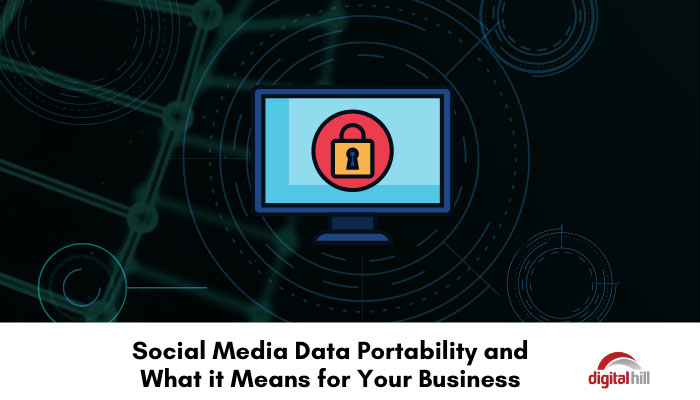Social Media Data Portability and What it Means for Your Business

If you’ve read the recently enacted General Data Protection Regulation (GDPR), you’ve likely come across the term “data portability.” Article 29 Working Party (WP29) of the GDPR highlights multiple benefits of data portability. It also identifies potential synergies if current privacy laws are applied together with the new personal data portability guidelines. Data portability and the implications for your business.
Specifically, it states that data portability can enable businesses and data subjects to maximize the returns from Big Data in a more balanced and transparent way. Data portability can also minimize discriminatory or unfair practices and reduce the risk of using the wrong data in decision-making.
Is the European Data Protection agency right, and if so, should you get aboard the data portability hype train? We think so.
What’s Data Portability?
In the simplest terms, data portability is the right to transfer personal information from one organization (known as the controller) to another. It can also be the right to transfer from one computing environment to the next.
Under the GDPR, the right to data portability allows data subjects (users) to receive the personal data they provide to the controller in a standard, machine-readable format. Users also have the right to transmit such data to another controller of their choice.
What’s the Purpose of Data Portability?
Data portability is mainly cited as a tool to counter the influence of large digital platforms. By giving users the power to download their data from one organization and transfer it to a different organization of their choice, the portability law puts the control in the user’s hands.
This can be especially effective in countering the authority of rogue social media networks, especially Facebook and its subsidiaries.
Facebook’s trove of data user data is its most valuable asset. While it’s a good thing for the social network, it causes challenges everywhere else.
For instance, currently, upstart platforms can’t compete without access to Facebook’s data. Yet, Facebook has in many instances refused to share its data.
Facebook has also been caught abusing data privacy laws to the detriment of users. The Cambridge Analytica scandal quickly comes to mind. You might have also read about how Facebook recently harvested email contacts of 1.5 million users without their knowledge and other similar data scandals.
So, why can’t frustrated users leave the platform? Because often nearly every detail about their life is on Facebook. From childhood photos to wedding videos and work profiles to conversations with friends and family. Leaving all that information behind is a significant disincentive to jump platforms.
Data portability solves this problem by allowing users to bring all their data with them whenever they choose to leave one social network for another.
What Does Data Portability Mean for Your Business?
Although data portability laws primarily target large social media networks, the implications may impact smaller businesses too. Here’s how;
- It gives your customers the right to automatically receive the personal data concerning them in an easy, readable format. Do you have the capacity to deliver on such requests?
- It levels the playing field for newer service providers that wish to take on more established organizations – essentially an opportunity for new businesses.
- It creates fresh security concerns. Security is a moving target. While portability may be a good thing, cybercriminals may see therein a weak link in the security chain and target the data in transit. This means brands need to invest even more in their security systems.
- By using a preference management solution, users can control their preferences and decide what is done with their data. Not only does this improve customer relationships, but also increases engagement which can lead to increased spending.
You May Not Have a Choice, After All
Everyone who keeps consumer data will soon be required to have portability tools and processes to facilitate smooth data transfers. You may want to begin preparing now to avoid compliance penalties.